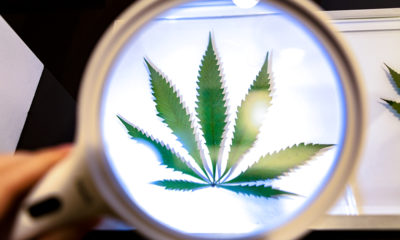
Medical
The Feds Request Info on Cannabis & Migraines
About 39 million American suffer from migraines. Amid restrictions on studying cannabis, the federal government is looking for information about whether or not cannabis can help with the extreme headaches.
The federal Department of Health and Human Services’ Agency for Healthcare Research and Quality (AHRQ) is putting out a call for research on marijuana’s impact on migraines.
The request comes as part of a wider call from the AHRQ seeking scientific information submissions from the public for review on treatments for Acute Episodic Migraines. The review is currently in progress and being conducted by the AHRQ’s Evidence-based Practice Centers (EPC) Program. The agency said any scientific materials, published or not, that could inform the review are welcome.
A big part of what the AHRQ is trying to do is compare the effectiveness of opioid therapy versus an array of non-opioid pharmacologic therapies. In addition to marijuana, they’ll look at more traditional pharmaceutical options for migraine relief like acetaminophen, nonsteroidal anti-inflammatory drugs, triptans, muscle relaxants and anti-nausea medications, among others. So needless to say, cannabis sounds the most user-friendly of the bunch for sure.
The AHRQ will also be comparing non-pharmacologic therapy options, like exercise or acupuncture, and their impacts on migraines.
For all the treatment options, they’ll be looking for results and info related to things like starting pain, how the person is able to function during treatment, how satisfied the patients are with the pain relief and how their general quality of life is with the treatment. They’ll also look at potential to abuse treatment and overdoses. We imagine cannabis will score well against other treatments in this category, but we can’t imagine anyone has ever overdosed from acupuncture either.
Looking at how effective cannabis is as a treatment for migraines is certainly not a new idea. In 1998, the International Association for the Study of Pain accepted a paper from the long-time cannabis researcher and neurologist Ethan Russo on the subject.
“Cannabis, or marijuana, has been used for centuries for both symptomatic and prophylactic treatment of migraine,” Russo wrote. “It was highly esteemed as a headache remedy by the most prominent physicians of the age between 1874 and 1942, remaining part of the Western pharmacopeia for this indication even into the mid-twentieth century.”
Russo noted that anecdotal evidence suggests that cannabis is still an effective treatment for migraines, and said that he “believes that controlled clinical trials of cannabis in acute migraine treatment are warranted.”
Russo went on to note it’s hard for physicians to simply wrap their heads around how prominent cannabis was as medicine before prohibition. Russo said that research from before 1974 examined five case studies of patients who voluntarily experimented with the substance to treat painful conditions. Three of the people taking part had chronic headaches and found relief by smoking cannabis “that was comparable, or superior to ergotamine tartrate and aspirin.”
In recent times, there is still plenty riding on the quest to understand why people with migraines get relief from cannabis, so much so here we are talking about the federal government trying to figure it out.
Last month, we noted why migraines are such a big deal — not only for women who are two to three times more likely to suffer from migraines than men, but for all people suffering. Research published by Washington State University in November showed that in the 20,000 cannabis use sessions they tracked where people were trying to get relief for a headache, they were successful 90% of the time. Sounds like it’s worth a shot before diving down the rabbit hole of Big Pharma.
TELL US, do you use cannabis to treat any of your medical problems?
























